- Home
- Derek Ciccone
Psycho Hill (JP Warner Book 3) Page 2
Psycho Hill (JP Warner Book 3) Read online
Page 2
Woodrow grinned. “Don’t worry your pretty little head—if he gets himself murdered tonight, it isn’t going to come from me. You two came up here for some hanky-panky, so I’m going to make sure he follows through on the dare.”
He flashed the knife in front of Archie’s face. “Go ahead … that’s why you came here. Get to it!”
Archie remained still.
“I guess if you’re too chicken, then I’ll have to take care of business for you,” Woodrow said. “This is a real-man’s sport, so step aside.”
He pushed Poca down onto the blanket and climbed on top of her. He ran the knife softly over her bare shoulders and then slowly dragged it down her body until he reached her legs. There was little she could do—he was a Hastings, and she was just an Indian girl, even if she was the chief’s daughter. Everyone understood the pecking order in Rockfield.
He cut the dress off her like he was opening a mail package. This time she tried to fight him off, scratching anywhere she could—face, neck, arms—and screamed at the top of her lungs.
Hastings tore the dress away, leaving her naked on the bed. He grinned again, holding the knife just under her chin. “Why don’t you lay back like a good squaw, and enjoy it.”
Just as the words left his mouth he bent over in agony, and fell off to the side, as the steel fire poker blasted into his midsection. Archie swung again, breaking another rib. Woodrow rolled over and groaned, dropping the knife. Archie raised the poker once more, ready to finish the job … but Poca stopped him.
She struggled to her feet. “What did I tell you about running, and not looking back?”
He looked overwhelmed, so Poca grabbed his hand and began to pull him away. Archie grabbed his letterman jacket and draped it over her naked body. He was a man of honor—the complete opposite of most she’d come across in this town—and she was briefly saddened it had to come to this, and that Thomas Archibald’s life was about to end. But there was no turning back now.
They ran, hand in hand, across the dark grounds. They didn’t even stop when they passed the gang, who were still hanging by The Tower, waiting in anticipation for some salacious details. It seemed like hours before they reached the area along Zycko Hill Road where they had parked their cars. They hopped into Archie’s fire-engine red Studebaker Lark, and sped away up the winding hill. But when they neared the bridge, he slammed on the brakes, and the car came to a skidding stop. They both spotted the figure about fifty yards away. He or she was wearing only a bathrobe, and it was impossible to make out the face.
They shielded their eyes as a bright light shot at them. Archie pulled Poca down below the dashboard. “I need you to get out and run back to the others.”
“Are you sure?” she asked, but they both knew there was no other option but to face this head on. He just nodded.
She swung the heavy door open and began to run. She never looked back, her bare feet feeling like they were hammering nails into the pavement, until she reached the others. When they returned to the bridge, Archie and his car were gone, and there was no sign of any mysterious figure.
Chapter 3
Rockfield, Connecticut
Friday before Labor Day—Present
Mark Twain once referred to golf as a good walk ruined.
But a much less heralded writer, and former member of the traveling news circus, JP Warner, thought it would be better described as an aggravating hike through rugged terrain in search of another errant shot, with the reward for its discovery being further torture.
My too-tight golf shoes crunched branches, and the sun disappeared from sight, as I again entered the woods in search of my ball. Back on the eleventh hole I decided that if I survived the day without a severe case of poison ivy or a rattlesnake bite, I would consider it a win, no matter what my scorecard read. The only saving grace was that this was the final hole.
I used my club to push back bushes and shrubs, without any luck. Then came a lifeline from my fellow hiker and bad ball-striker, Lewis Hastings. “Right there,” he said, pointing at the dimpled white ball that was sitting beside a cedar tree, like he’d just located the final egg at the annual Easter egg hunt.
I’d always thought of Lewis Hastings as a self-indulgent, pretentious jerk, who was born on third base and thought he’d hit a triple, or whatever other cliché fit the stereotype. He was four years my senior, and was part of a clique that used to pick on us younger kids back in the day. He might not have been the leader or instigator, and granted, I’d barely come in contact with him over the last twenty years, but you don’t forget things like that.
But the funny thing about journeying eighteen rolling hills of golf with someone is you get a certain insight into them, and it seemed as if Lewis and I had a few things in common. For one, we both sucked at golf. This was a little surprising in his case, since his family owns this golf course, along with most of the property on the north side of town.
Another commonality is that we, along with our siblings, were named after historical figures. My mother, the resident town historian, named my brothers and me after accomplished people who were born in our home state of Connecticut. I was named after John Pierpont Morgan, who also went by JP. My brother Ethan was named after the revolutionary war hero, Ethan Allen, and my late brother Noah was the namesake of Noah Webster.
Due to their mother’s influence—the French model Monique Diaw—Lewis’ oldest sister, Louisa, was named after one of the many King Louis’ who had ruled France, while her twin brother, Nap, took his name from Napoleon. In contrast, Lewis was named after Jerry Lewis.
Now I know that for some reason Jerry Lewis is a big deal in France, but when firstborn children are named after rulers and kings, you are establishing expectations. So being the namesake of a quirky comedian relegated Lewis to the court jester from day one in the Hastings kingdom. He runs the Hastings Inn and the family farm in Rockfield, along with this golf course, while his globetrotting siblings were given the keys to the much more glamorous movie production business. He was still better off than most people, but in his world he’s the black sheep, and as the day went on I developed a dose of empathy for him.
“I’d go with a 5-iron,” Lewis suggested as I lined up my shot. He knew golf a lot better than he played it.
“I’d probably be better served using a weed whacker,” I replied, and got a laugh back. He seemed to loosen up once we entered the woods, as if he was able to leave behind the outside world where his every word was monitored.
I followed his advice, and took out my frustrations on the unsuspecting golf ball with a violent swing. The ball took off like a rocket, whistling through the small opening between the trees and reentering the sun-filled day. I shaded my eyes as I watched the white dot majestically rise, before falling softly onto the green, where it stopped no more than a foot from the pin.
“Dammit!” I yelled.
Lewis looked confused. “What are you mad at? That’s one of the best shots I’ve ever seen.”
“I always hit one great shot like that, right after I vow to never play golf again, and it brings me back the next time.”
He nodded with a knowing grin.
After Lewis took a more pragmatic two-shot approach to the green, we walked up the fairway together—golf survivors united.
It wasn’t all doom and gloom. After a year where my body served as a human piñata, my health had returned for the most part—the damaged knee felt sturdy, and all the lingering symptoms from my concussion had ceased. And while my game left a lot to be desired, I still looked the part. A newsboy hat and knickers, along with a neon orange Polo shirt. I didn’t win “Most Stylish News Personality” eight years running for nothing. I was even nicknamed J-News, since it looked like I belonged on the cover of the J-Crew catalog, rather than in the buttoned-up television news industry.
We were greeted on the green by our fathers, who had spent much less time bonding in the woods. Longtime, and soon to be retiring Rockfield First Selectman, Peter War
ner, proudly patted me on the back after I tapped in, adding, “Great shot, son,” as if the first ten shots I took on this hole never happened.
Woodrow Hastings, his tanned face contrasting with his senatorial white hair, joined in the congratulations. Before we teed off on the first hole, he asked me what my handicap was, to which I replied “my swing.” He laughed the phoniest laugh I’d ever heard. At that point, it became clear that I was the reason we were here today, and I had a pretty good idea why.
Chapter 4
The one hole I’ve mastered in golf is the nineteenth.
We moved inside the cozy tavern, located next to the clubhouse. It was dedicated to the memory of Joseph Hastings Sr., Woodrow’s father, who was credited with turning their family into the most prominent in Rockfield.
My father and I ordered ice teas. Since I was doing the driving I stuck to sweetened, while he went with the Long Island variety. Woodrow had a scotch, which seemed to fit. And Lewis stuck to a mineral water with lemon—he’d mentioned his “recovery” on a couple of occasions during our ventures into the woods, but I never furthered the subject.
Woodrow announced that since he had the best score of the round, the drinks would be on him. Very generous, being that he owned the place. He then made a toast to my father. “To Peter—on his retirement … again. May this one last longer.”
It was a good line from a skilled politician, even if he never held political office—the best politicians never do. And after we clanked glasses, he continued, “But in all seriousness, you truly are irreplaceable, Peter. The best we can hope for is to find someone who loves Rockfield as much as you do. I was never able to fully replace my father, but because I had the same passion for the town, we’ve been able to carry on.”
He held a gaze on me as he spoke. Here we go.
I was familiar with these agenda-driven orchestrations, most notably coming from my former boss Cliff Sutcliffe, and his partner in crime, Lauren Bowden—Hastings was just better at it.
Being in charge of the Hastings Fund, which has subsidized huge portions of Rockfield since his father created it in the 1960s, had made Woodrow the most important ally for the first selectman in this town. So he and my father had countless golf outings, meetings, and power lunches over the years, and never once was it requested that I join them.
“Your timing has always been impeccable, Peter,” Woodrow went on. “And you’ve picked the right time to leave. When that casino goes through, this place won’t be recognizable anymore.”
Heads nodded somberly, including my father’s.
He was referring to the Samerauk Tribal Nation’s push to build a large casino on their land, which happens to border on this very golf course. The courts granted them federal recognition this past summer, opening the door. Other tribes in Connecticut have already built casinos, Foxwoods and Mohegan Sun the most notable. But because those same courts upheld a 1930 agreement between Rockfield and the Samerauk Nation, Rockfield’s first selectman has to sign off on it. It’s become the hot election issue, and Woodrow was right about one thing—it will dramatically change the area if it goes through.
Woodrow continued, “I never would have believed that Rockfield would willingly agree to such a monstrosity, but the demographics have changed a lot in the last decade. Many younger families have moved into town, and they see the possibilities of growth—new money, restaurants, entertainment—but not the dangers. Or perhaps they don’t care—they’ll take the profit on the sale of their homes and move on to the next town.”
“Times have definitely changed, but I wouldn’t start buying the slot machines just yet. Never underestimate the passion of our longtime residents, and how protective they are of Rockfield,” my father tried to be diplomatic … sounding like, well, a politician.
“If you were running again, Peter, I’d have all the confidence in the world. But Ed Coachman couldn’t beat Maloney last time, and he isn’t going to beat him this time.”
I felt a rumble of guilt in my stomach. I removed my sanctions on Bobby Maloney last spring, and gave my blessing for him to run for first selectman. This was before I knew of the court ruling, and the possible casino, which he is supporting. And now with half the residents having money-signs in their eyes, the information I have on him probably wouldn’t stop his election, anyway.
My father countered, “I like Bobby, but he goes the direction the wind blows. So what Rockfield needs to do, if they want to hold off the casino, is not necessarily to be victorious in the election, but to win a campaign for the hearts and minds of the residents—let them know how this project will truly change the town they purchased a home in, and remind them why they moved here in the first place. It wasn’t for more traffic … an increase in crime … things of that nature.”
Woodrow remained unconvinced. “What we need is Noah to come back to life.”
My father and I were first surprised, and then taken aback. Woodrow instantly realized the impact of his words. “I’m so sorry … and on this weekend of all times. I didn’t mean your Noah. What I meant to say is that this casino is coming in like a two-hundred-year flood and we’ll need an Ark to survive.”
A reasonable reply, but with it being the first anniversary of my brother’s murder this weekend, emotions were touchy.
It also was another subtle reminder of how short life was, and how I no longer have the time or patience for games like the one Woodrow Hastings was playing. So I decided to get all the cards on the table. “To find someone who feels as strongly about Rockfield as my father, I would suggest keeping it in the family. Perhaps his son could take over for him, like you did for your father.”
Woodrow looked pleasantly surprised. I just made his job easier, and he didn’t even have to buy me dinner.
“So you’d be interested?” he asked.
I shook my head. “Me? Not a chance. I was thinking of Ethan.”
The air came out of Woodrow’s balloon. “With all due respect, your brother is not you. He might be effective at the job, but you were born to do it.”
“I don’t have any experience as a politician.”
“Neither did your father when he began, and that turned out pretty well.” He smiled, before adding, “And as badly as we need you, JP, I think you need us just as bad.”
“And why is that?”
“I can tell that you’re craving a challenge. Dabbling at the Gazette, and an occasional special for GNZ, can’t be cutting it for someone as driven as you.”
“I’m very happy with what I’m doing. If I wasn’t, I’d be on a plane to some country halfway around the world to cover a story.”
Woodrow looked at my father and shrugged. “Like I said—a natural politician.” He then sent me a serious look, his brow creasing. “I think you came back to Rockfield for a bigger purpose. To save the place that gave you so much—the place you and Gwen will want to raise your own children in one day.”
He had a point. Actually, lots of points. And he was good, softly touching all my weak spots … Gwen, Noah, Rockfield.
Woodrow had the look of a winner as he swigged the remainder of his scotch. He set down the glass, leaned back in his chair, and let out an extended ahh. “I’m not trying to pressure you, JP, but I truly believe you’re our last chance to maintain Rockfield as we know it. And I have nothing to gain—our family would probably double our worth if that casino is built. But I believe in Rockfield, just like my father, and yours … and I feel in my heart that you do as well. So all that I ask is you think it over and get back to me after the weekend.”
I meant to say, thanks but no thanks, but it came out as, “I will, thank you. You’ve given me a lot to think about.”
Woodrow looked like he was about to smoke a cigarette and leave me cab fare on the dresser. “Time marches on, but that doesn’t mean we have to let it step on us,” he said, before glancing at the watch on his tanned wrist. “Speaking of time, I have a meeting to get to in the city. I apologize, but I’m sure we’ll be
talking again real soon, JP.”
We all stood and shook hands, and Woodrow Hastings exited. He might as well have dropped the mic on his way out.
After finishing our drinks, Lewis escorted us to the parking lot. We arrived just in time to see his father holding open the door of his gold 1960 Rolls Royce Cloud for a stunning blonde, wearing a skirt that proved she had the best short game of anyone at the course. I guessed she could be his daughter, but I got the feeling she wasn’t.
For a moment I had a “holding doors for blonde” flashback to my regrettable time dating Lauren Bowden. I actually thought it might be her—she had a way of popping into my life at the most inopportune times. Upon closer examination, it wasn’t, but I still felt like I knew this woman from somewhere … I just couldn’t place her.
Lewis seemed to read my mind. “It’s Jill Leezy.”
I did a double take. Jill was one of a couple of classmates to miss our reunion last May, and now I could see why—she was obviously too busy transforming herself into an entirely different person.
“Wow—she’s changed quite a bit since the last time I saw her.”
“Especially in two places I can think of,” Lewis once again showed off the dry sense of humor he displayed during our round of golf.
On that note, Lewis and I said our goodbyes and parted ways. I didn’t see Gwen and me double-dating with him and his wife anytime soon, but I found him quite genuine … for a Hastings, anyway. I guess the lesson would be: it’s probably best not to judge people by their actions as teenagers.
I headed for my Jeep, which was a family hand-me-down, and the antithesis of Woodrow Hastings’ Rolls Royce. As I did, Woodrow passed us by with a honk and the confident smile of a man who always gets what he wants.
Chapter 5
Saturday—Rockfield Fair
The aqua sky above the Rockfield Fair on Saturday afternoon was glorious. But I sensed the storm clouds above me.

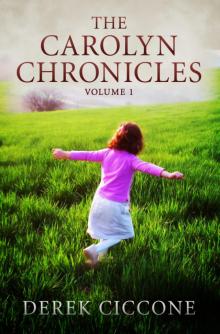 The Carolyn Chronicles, Volume 1
The Carolyn Chronicles, Volume 1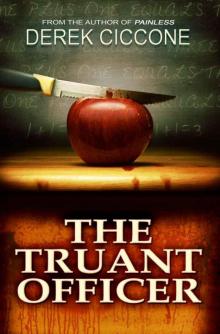 The Truant Officer v5
The Truant Officer v5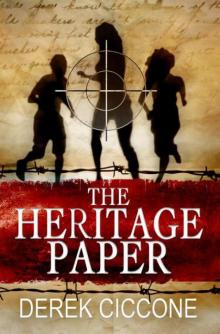 The Heritage Paper
The Heritage Paper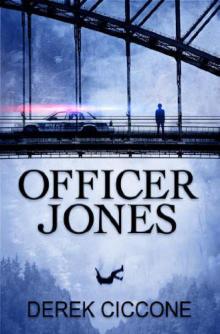 (2012) Officer Jones
(2012) Officer Jones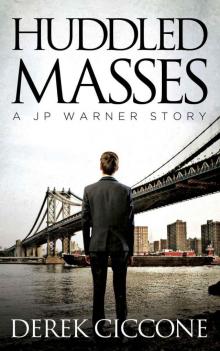 Huddled Masses (JP Warner Book 2)
Huddled Masses (JP Warner Book 2)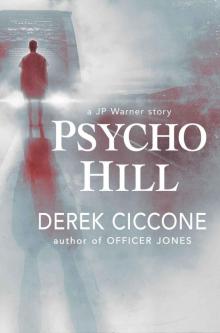 Psycho Hill (JP Warner Book 3)
Psycho Hill (JP Warner Book 3)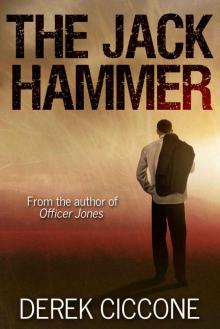 The Jack Hammer
The Jack Hammer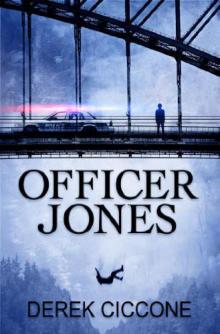 Officer Jones
Officer Jones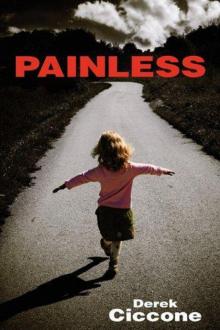 Painless
Painless